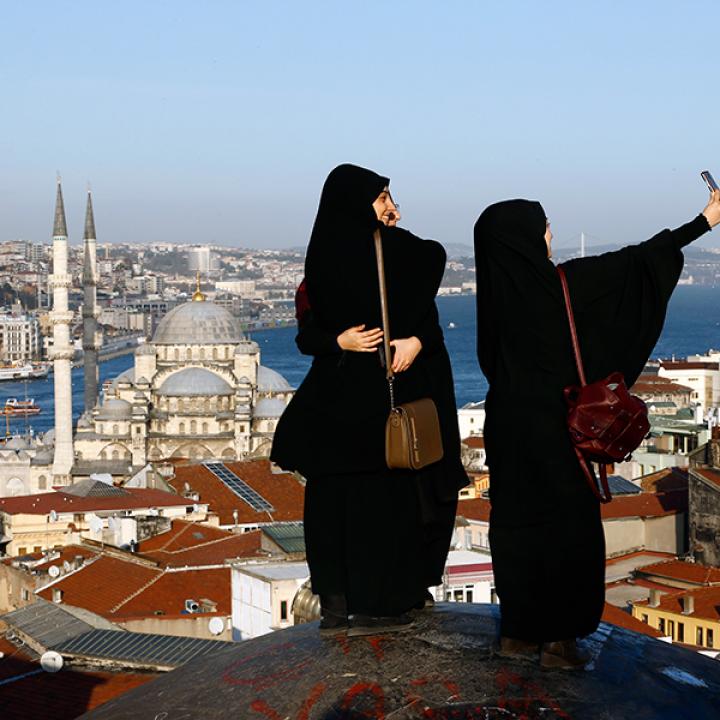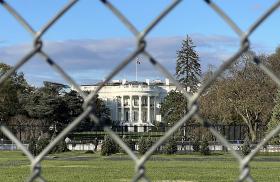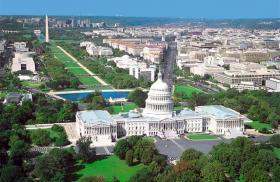
- Policy Analysis
- Congressional Testimony
Freedom of Religion in Turkey: Foreign Policy Implications
Also published in U.S. Commission on International Religious Freedom

The director of the Institute’s Turkish Research Program testifies on why Ankara remains vitally important to U.S. policy in the Middle East and the great power arena despite its major domestic shifts in mosque-state relations under President Erdogan.
Chair Hartzler, Vice Chair Mahmood, and honorable commissioners, thank you for the opportunity to testify today. I have been asked to discuss Turkey’s importance to the United States as a NATO ally and explain key dynamics informing its foreign policy and its ties with the United States today.
Ankara’s foreign policy has undergone a dramatic shift in the past two decades under President Recep Tayyip Erdogan, moving away from its earlier Eurocentric focus. There are many ways to interpret this shift, including religion and the political career of President Erdogan, among others. However, I believe that a more fundamental dynamic is at play here, one that is informed by shifts in the country’s demographics and global vocation.
European Origins
About a hundred years ago, following the collapse of the Ottoman Empire at the end of World War I, Mustafa Kemal Ataturk and his followers—known as Kemalists—forged the country as a European secular republic. At the republic’s founding, Turkey’s elites—many of them born in Europe and catapulted into Anatolia amid the collapse of the Ottoman Empire—held on to European-influenced ideas of statecraft and social life.
At the helm of this group, Ataturk expelled Islam into the private sphere, banned religious brotherhoods, purged Islam from Turkish laws, and came close to outlawing religious education. Additionally, he changed the country’s alphabet from an Arabic-based script to a Roman one, expunging Arabic and Persian words from Turkish while retaining French and Italian borrowings. Turkey also dropped the Islamic Hijri calendar in favor of the Western Gregorian alternative and banned fezzes and turbans for men.
Ataturk’s model for state-Islam relations in Turkey was freedom from religion in government and education. In this way, modern Turkey’s founder embedded the country firmly within Europe.
Ataturk’s European project, however, was by no means limited to the country’s elites. During the unraveling of the Ottoman Empire, which started in the nineteenth century, millions of Turks and non-Turkish Muslims—including Albanians, Bosnians, Bulgarians, Greeks, and Macedonians—moved into Anatolia, a transcontinental space spanning Europe, Eurasia, and the Middle East. Together with Muslims expelled by Russia from the former Ottoman territories north of the Black Sea (such as Circassia and Crimea), European Muslims thus accounted for nearly 40 percent of Turkey’s population by the time Ataturk founded the republic in 1923, and they tended to support Ataturk’s project of strict secularization and pro-European foreign policy.
Modern Turkey became a multiparty democracy in the 1950s, less than two decades after Ataturk’s death in 1938, and his Kemalist followers on the left and right, many of them born in the Balkans or descendants of immigrants from Europe, perpetuated the idea of Turkey as a European entity. Throughout the twentieth century, the Kemalists followed Ataturk in trying to shape Turkey and its institutions along European lines.
Turkey’s democratic evolution after World War II and inclusion in Europe during the Cold War further strengthened the country’s claims to a European and Western identity. It was a founding member of the Council of Europe and the Organisation for Economic Co-operation and Development, among other pan-European entities; it was also admitted to NATO soon after the alliance’s creation in 1952. And in 1987, it applied to join the European Union.
Shifting Demographics
With the passing of a century, however, the connection to Europe of many Turks became increasingly tenuous. To begin with, the share of citizens with European origins dropped precipitously throughout the twentieth century, while the percentage of Anatolians increased significantly. Accordingly, when Erdogan came to power in 2003, native Anatolians constituted an overwhelming majority of Turkey’s population. Hailing from the peninsula’s interior, this population tended to be devoutly Muslim, and for the most part had never been fully at ease with the republic’s secularist founding project.
As these conservative hinterland Turks began to enter the middle class and climb up the ladder of political power, the European identity that Ataturk grafted onto the nation became thinner with each passing decade, eventually falling away. Unlike the Kemalists, the new Anatolian elites do not think of themselves primarily as European, and their view has come to form the heart of Turkey’s geopolitical identity.
At the same time, the EU has been hesitant about its relationship to Turkey. Between 1995 and 2013, during the rapid expansion that followed the collapse of the Soviet Union and the end of the Cold War, the Union absorbed sixteen new countries. At first, it looked like Turkey might join this group: its own accession process had begun before the end of the Cold War, in 1987, and received a shot in the arm with Erdogan’s coming to power in 2003. Erdogan was hailed by Many European observers as a new style of moderate Islamist who was deeply committed to democratic institutions and willing to take on the country’s entrenched military and turn Turkey into a full-fledged democracy. In 2005, the EU started formal talks with Turkey regarding membership.
But Turkey remained on the outside. Soon after talks began, Brussels notified Ankara that no offer for membership would be forthcoming. The EU never started accession talks with a country that did not culminate in an offer of membership. The unique signaling this time around was clear: Turkey had no home in Europe.
Anatolians in Charge
At least since the early twenty-first century, the Western-leaning Turkish elites of yesteryear had begun to lose control over a society they had tried to direct since the country’s founding. Erdogan embodies that shift even though he is not entirely responsible for it. Unlike Ataturk, who came from the Ottoman Empire’s European provinces, Erdogan hails from Anatolia; his political base consists of pious Anatolians, many of whom never fully adopted Ataturk’s radically secularist project.
Accordingly, Erdogan’s Turkey has fewer emotional and political attachments to the West or Europe. In turn, the new Turkey he has crafted is anchored not in Europe but in the Turkish hinterland. Its foreign policy represents the political and cultural sensitivities of Anatolians far removed from the secularist ethos of the country’s founding elites. This Anatolian takeover is simply a product of Turkey’s demographic shift over the past decades and the diminishing hold of the old secular elites over Turkish society.
Turkey’s new Anatolian elites, often informed by more conservative strains of Islam, also see Islam as inherent to Turkey’s national identity. In fact, these new elites celebrate Islam as vigorously as Ataturk tried to suppress it.
President Erdogan’s Justice and Development Party (AKP) long sought to challenge and then eliminate Turkey’s Kemalist-era attachment to Europe and the West, and with that the country’s commitment to European-style secularism that mimicked (and perhaps exceeded in its severity) France’s system of laicity. Since coming to power, Erdogan has lifted Turkey’s Kemalist-era ban on the hijab while also allowing Islam to flood the country’s educational curriculum and political life. The new model for state-Islam relations in Turkey is freedom of religion in government and education.
Turkey’s Global Vocation Today
This is not to say that Turkey will abandon its seat at the Western table. After all, Turkey’s quest to join the West goes as far back as the first attempts at Europeanization by Ottoman elites in the early eighteenth century. It dates to the birth of modern Europe itself. Rather, with its center of gravity now in Anatolia, Turkey can be expected to position itself as a hybrid power between the West and the rest of the world.
This Turkey still sees itself as part of Europe, but not to the detriment of its other associations, such as Eurasian or Middle Eastern. Ankara now freely engages with Iran, Russia, the United States, wealthy Gulf monarchies, and others, along with Europe, without feeling that it must choose a favorite. Whereas twentieth-century Turkish leaders had an emotional attachment to Europe, Erdogan does not.
A European-influenced outlook governed Turkish foreign policy for decades, but the new Turkey will freely engage with other countries without regard to Western objectives or priorities. That is because Turkey now sees the world through an Anatolian lens.
A Middle Power and NATO Ally—with Multiple Identities
The new Turkey has many identities, none of them exclusive or easy to classify: if it is a Middle Eastern country, then it is the only Middle Eastern state that is also a Black Sea power. And if it is a European country, then it is the only European state that borders Iran. And if it is a Eurasian power, it is the only state that belongs to NATO.
More important still, Turkey is the only swing state—different from other swing states such as India, Brazil, or South Africa—that is simultaneously a middle power, a NATO member, and increasingly a global player, thanks to its ability to straddle East and West and, more recently, Global North and Global South.
How Should Washington Approach Cooperation with Turkey?
The best way for the United States to approach Turkey is to acknowledge the reality of these multiple alignments. Erdogan is fond of being seen as the center of things, with the world revolving around Turkey—he has tried to serve as an arbiter in the war in Ukraine, played an active role in the South Caucasus, and projected Turkey’s power in the Sahel, Horn of Africa, South Caucasus, and Western Balkans. He relishes being the dealmaker or middleman in regional conflicts, which boosts his already monumental standing at home. The United States would be better served to deal with Turkey as it does other middle powers such as India and Indonesia—engaging with Ankara in areas of potential cooperation while not anticipating complete alignment on all issues.
That said, here are areas in which Washington can productively work with Turkey:
Great power competition. Over the past decades, branching out from its exclusive focus on Europe, Turkey has built significant soft and hard power—from drone sales and defense treaties to educational and religious institutions—in Africa, Southeast Europe, the South Caucasus, and Central Asia. In view of Turkey’s role on the global scene, the Trump administration should consider cooperating with Turkey to amplify America’s global power in great power competition and engage in successful competition against China and Russia in the noted areas of Turkish influence.
Syria. Turning to the Middle East and considering President Trump’s calls to “end the wars,” Ankara has already effectively ended the war in Syria through its proxies and can continue to play a key role in bringing further stability to that country. This would be important in preventing new refugee flows as well as an Islamic State comeback, among other challenges. Today, Syria is the most important and immediate area of U.S.-Turkish cooperation, with the Trump administration relying greatly on Turkey’s institutions to stabilize Syria.
Ukraine. Playing a swing-state role, Turkey has kept open channels of communication with both Russia and Ukraine throughout the Ukraine war. To this end, Ankara has supported Ukraine militarily, while keeping open economic ties with Russia. Accordingly, today Ankara has the ears of both combatants.
Even if an ultimate end to that conflict will have to be ironed out between the United States and Russia, Turkey, which has already brokered important deals between Russia and Ukraine, such as a grain corridor and prisoner exchange, can help manage the conflict until a ceasefire is reached. And once it is time for ceasefire talks, Turkey is likely to host these negotiations—potentially helping end yet another war.
Iran’s regional influence. In recent years, Ankara has increased its influence in Iraq, providing some sort of balance against Iran’s presence there. At the same time, considering open channels of communication between Ankara and Tehran, Turkey—which opposes military targeting of Iran—could play a role backing the Trump administration’s diplomatic efforts to prevent Iran’s nuclearization.
Turkey-Israel Ties
Considering the mostly positive trajectory of Turkish foreign policy and U.S.-Turkey cooperation, the greatest risks today lie in Turkey-Israel ties. In late 2024, the Turkish-allied jihadist group Hayat Tahrir al-Sham (HTS) took over Damascus, ending decades of Assad regime rule in Syria and essentially kicking Iran out of the country. However, Israel considers Turkey’s newfound influence in Damascus a threat. This may be an exaggerated fear: while President Erdogan is not a fan of Israel’s policies regionally, unlike the Iranians, he does not want to destroy Israel: he is simply critical of its policies, if harshly so.
Yet the recent conflict between Israel and Syria’s new Turkish-backed government suggests tensions are not yet fully resolved. Keeping Turkish relations with Israel afloat will require work from President Trump, relying on his rapport with President Erdogan and Israeli Prime Minister Binyamin Netanyahu. To this end, Trump should consider brokering a detente between the two states in Syria.
Presidential Dialogue
The relationship between Presidents Trump and Erdogan is—indeed—the greatest asset for bilateral ties. It has allowed the two principals to settle past bilateral differences and might lead to future resolutions regarding military sales and cooperation. To this end, regular presidential-level meetings and open communication between the two leaders should be supplemented by stronger dialogue between the countries’ bureaucratic agencies, legislatures, and policymakers.
Soner Cagaptay is the Beyer Family Senior Fellow at The Washington Institute, director of its Turkish Research Program, and author of its presidential transition memo “Building on Momentum in U.S.-Turkey Relations."



